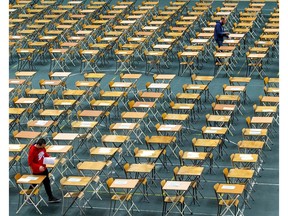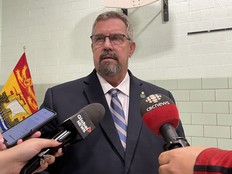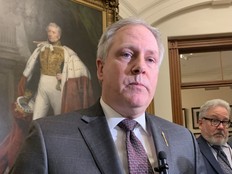International student numbers in N.B. likely to grow, despite cap: data
Province’s institutions are still bringing in thousands of students who aren’t subject to new federal restrictions

Article content
Government figures show that the number of international students in New Brunswick could easily grow next year, despite the federal government’s cap.
That’s as the province’s institutions are still bringing in thousands of international students who aren’t subject to new federal restrictions.
And as Ottawa is actually still providing a little room for undergrad growth in New Brunswick.
It’s allowing some schools to avoid any impact to enrolment, even as the feds are slashing by 35 per cent the number of undergraduate study permits it hands out across the country.
Federal data, obtained by Brunswick News, shows Ottawa approved 8,765 international students to study at New Brunswick institutions in 2023.
But provincial figures show just 4,912 were undergrads, now subject to a cap.
The federal government announced in January it’s cutting undergraduate study permits it hands out across the country, in response to concerns that newcomers were adding to the national housing crisis.
In New Brunswick, 2,007 international students were graduate or masters students, a number that isn’t being capped by Ottawa.
There were also 1,846 study permit extensions, another number that can grow.
That’s as New Brunswick has been allotted 5,580 undergraduate spots for the school year ahead, a number that’s 668 more than in the current school year.
In a statement, the federal government acknowledged the number of international students coming to New Brunswick or other provinces could still go up, even with a cap on undergrads.
“The resulting change in the number of international students will be affected by a number of factors, including how provinces and territories use their allocation, whether they use their full allocation, and whether the approval rate for study permit applications increases or decreases in 2024,” said Immigration, Refugees and Citizenship Canada spokesperson Julie Lafortune.
“Students extending existing study permits, and those pursuing master’s and doctoral degrees or elementary and secondary education are exempt from the two-year cap on study permit applications.”
Whether that is a concern to Ottawa, Lafortune added that “Immigration, Refugees and Citizenship Canada will continue monitoring the international student program in order to uphold its integrity.”
Graduate students aren’t capped
Ottawa is also capping the number of attestation or acceptance letters that New Brunswick can issue at 9,300, based on an assumption that 60 per cent of the students offered a spot will accept and move here.
The Higgs government has now distributed them as schools attempt to find a new cohort of international students.
It shows that some schools face little impact.
“We have received an allotment of 15 attestation letters which should allow us to maintain the admission levels of our undergraduate international students from last year,” said Crandall University provost Jon Ohlhauser.
But that’s as Crandall welcomed 455 new international students last year.
The school says only nine were undergrads.
“We have a significantly larger intake of international graduate students than undergraduate students,” Ohlhauser said.
“This has been true for the past six years.”
It means Crandall still plans to bring to the province hundreds of newcomers to study.
That 455 international student enrolment number last year is actually down from two years ago in 2021 when Crandall accepted 534 international students, according to federal figures.
Atlantic Business College had 32 international study permits approved, according to the federal government, but just 13 were undergrads.
The figures show that l’Université de Moncton had 1,940 international study permits approved, while the province’s numbers state 1,027 were undergrads.
Extended stay
The feds also approve extensions to existing study permits, another stream of international students that isn’t being capped by Ottawa.
The expiry date of a study permit is typically the length of the program, plus an extra 90 days, time to prepare to leave Canada or to extend your stay in Canada.
But international students can seek to extend their stay to keep studying.
An undergrad who studied to become a personal support worker could continue studies towards licensed practical nurse certification, or even another subject altogether.
It’s an option NBCC says it’s considering.
The post-secondary institution currently has a student acceptance rate of 35 per cent.
If that continues, it will see a drop in student numbers as it has 1,744 international undergrads in the current year, but has only been allocated 2,794 acceptance letters for the year ahead.
That’s a conversion rate of 62.42 per cent to keep the same level of students.
“Among other things, we are hosting an ongoing series of webinars to support applicants in strengthening their study permit applications,” spokesperson Charray Owen said.
“While we do not have masters-level programs that are exempt from the cap, current students who extend their study permits are exempt.
“This is an example of an area we’re looking at closely.”
Closing the acceptance gap
Others say they can only focus on getting a better acceptance rate.
While St. Thomas University does have a new master of social work program that is attracting new international applicants, the institution maintains it wants to remain a primarily undergraduate university.
Instead, it’s now changing how they hand out acceptance attestation letters.
“The new process will include additional communication and virtual meetings between our admissions counsellors and accepted applicants,” said Ryan Sullivan, associate vice president of enrolment management at STU.
“We’re optimistic the new process will result in a higher yield conversion rate than in previous years.”
The province’s numbers show that St. Thomas University welcomed 117 international undergrads this school year, but has now only been given 200 acceptance letters to hand out in the year ahead, a 58.5 per cent conversion rate to keep the same level of students.












Postmedia is committed to maintaining a lively but civil forum for discussion. Please keep comments relevant and respectful. Comments may take up to an hour to appear on the site. You will receive an email if there is a reply to your comment, an update to a thread you follow or if a user you follow comments. Visit our Community Guidelines for more information.